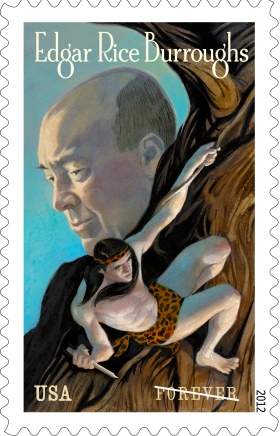A century ago, Tarzan—the most famous creation of Edgar Rice Burroughs—leaped from the pages of magazines and books and into movies, the funny pages, and radio shows. Rediscovered and reinvented by later generations, Burroughs’ famous hero has since appeared in television series and video games, and the original Tarzan tales fill more than two dozen books. We can’t be blamed, then, if we sometimes forget that Burroughs’ mind often wasn’t on the jungle, but out among the stars.
Today, Hollywood reminds us that Burroughs was, at heart, a science fiction writer—a prolific and influential one, too, credited with popularizing what scholars now dub “planetary romance.” A mash-up of futuristic technology with anachronisms like sword-fighting and feudal pageantry, these swashbuckling tales flourished in pulp magazines from the 1920s until World War II, giving adventure-hungry readers their ultimate hero:
Burroughs’ first published story was, in fact, his first John Carter story. “Under the Moons of Mars” which graced the pages of All-Story magazine in 1912, introduced a Confederate Civil War vet mysteriously transported to Mars. In all, Burroughs wrote eleven John Carter books, thrilling the next generation of young science fiction writers and setting the interplanetary stage for the phenomenon that would be Star Wars.
With more than a century of science fiction to explore, why do readers return to Burroughs for high adventure? Maybe because he knew how to “call out to the human psyche at a largely unconscious level,” writes science fiction and mystery writer Richard A. Lupoff, who argues that the Mars books “call up the suppressed urges of the primitive man to take sword in hand and confront once and for all the vexatious world around him.”
Burroughs himself was famously restless, serving with the U.S. Cavalry and holding a dizzying array of unsatisfying jobs until he found a route to greatness through his own imagination. He never stopped thinking big: “If there is a hereafter,” he said shortly before he died in 1950, “I want to travel through space to visit other planets.”
Did Burroughs get his wish or not? We can’t say—but few writers can boast a feature film and a stamp celebrating the staying power of a century, as fine a claim to literary immortality as any. John Carter may yet outlive us all; check back in 2112.
Tarzan™ Owned by Edgar Rice Burroughs, Inc. and Used by Permission.

